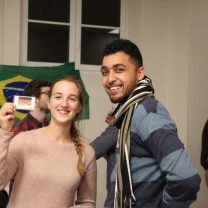ESA’s international strategy reaffirms the values in our charter !
Openess to the world, solidarity and personal development. Our strategy is based on three sturdy pillars:
- Encourage our learners to be open and aware of intercultural issues
ESA students in all study programs, are encouraged to be open to the outside world. This is acheived through missions abroad and developing connections with the international students present on our campus – over 35 nationalities.
- Support international business
Preparing students for their entry into the professional world and improving their employment opportunities at home and abroad. Founded 120 years ago, ESA continues to offer professional training to French and international students for agro-industry in a modern global context.
- Assist, promote and encourage employees’ international experiences
ESA has a partnership network of nearly 150 establishments, including several leading universities. This network is at the heart of ESA’s international development, offering international experiences for students, lecturers, lecturer-researchers and administrative staff alike.
4 major actions
This strategy is implemented in four different ways:
Whether studying at Bachelor, Masters or Doctoral level, we provide adapted programmes and educational methods, special adjustment sessions and individualised tutoring and research scholarships for foreign students.
- Masters level programmes – Today we have two distinct masters programmes taught in English. 20% of our Masters level graduates are international students. For French students, exchange experiences are an integral part of the training.
- Bachelor-level programmes: We have started to introduce more and more English taught modules in our different bachelor level programmes.
Student mobility
Incoming Mobility:
- Ensure the balance of flows by developing placements through a practical training offer thanks to the proximity with local farms and companies;
- accommodate PhD students or offer internships in the research units; provide training completely or partially in English; communicate on the effort made to bring the level of non-French speakers up to scratch (online and face-to-face, French as a foreign language classes).
- Offer incoming students a welcome facility (accommodation and support for administrative procedures).
- Promote double qualifications, existing and to be created.
Outgoing Mobility:
- Ensure the balance of outgoing students by developing placements through a practical training offer thanks to the proximity with local farms and companies;
Lecturer mobility
– Encourage incoming mobility by welcoming visiting professors.
– Encourage outward mobility of the teaching body by providing opportunities and help in setting up funding applications.
Strengthen key partnerships, according to thematic priorities rather than geographical ones (e.g. emphasis placed on the institutions in the wine-producing countries of the world):
– Partners with which we already have numerous joint actions: student and lecturer mobility, masters, double qualifications, etc.
– Partners, with which we have common research themes and training programmes.
Develop new partnerships when the school expresses a need (training, research, etc.). Geographic priorities too have a place here: we want to have a greater presence in central Europe, South America, particularly Brazil, and North America.
This calls for: the creation of double qualifications supported by teams of lecturer-researchers; the identification of countries with which the tutoring of theses is feasible and funded; joint responses to calls to tenders or finding funding for welcoming invited lecturer-researchers.
- Download our Erasmus charter

Main objectives of our International Relations Office
- To coordinate the internationalisation of ESA, its staff, programs and research.
- To strengthen ESA’s reputation and position in the agricultural higher education sector in France and internationally.
- Encourage the mobility of all French and international students
- Encourage the mobility of academic and administrative staff
Projects and priorities of our International Relations Office
- Continuous improvement of our student mobility model (IN/OUT study trips, Double Degrees, Summer Program, etc;).
- Diversifying our methods of recruiting international graduate students.
- Building successful Strategic International Partnerships
- Create an international network of shared competences on our 4 strategic axes,
- Develop international activities in medium and high complexity formats with these Strategic International Partners.
- Identify opportunities for academic collaboration on the African continent.
- Mobilise human and financial resources to support all international activities.

